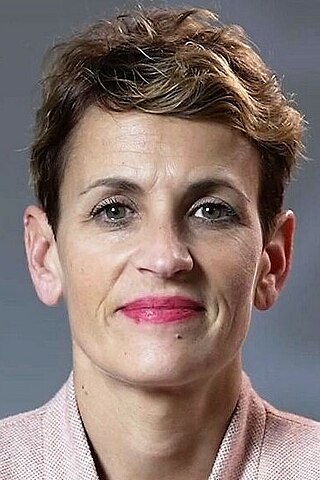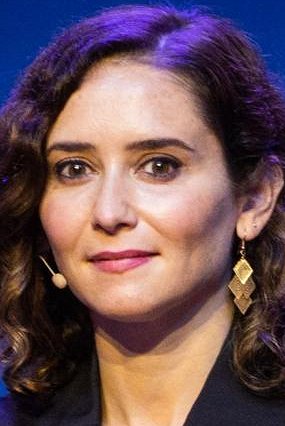
The president of the Community of Madrid is the highest-ranking officer of the Autonomous Community of Madrid and the head of the executive branch. The office is currently held by Isabel Díaz Ayuso of the People's Party.

The president of the Valencian Government is the head of the Generalitat Valenciana, the government of the Spanish autonomous community of Valencia. The president is chosen by the Valencian parliament, the Corts Valencianes.

The president of the Balearic Islands is the head of government of the Balearic Islands, one of the 17 autonomous communities of Spain, while the monarch Felipe VI remains the head of state as King of Spain.

The president of La Rioja is the head of government of the Spanish autonomous community of La Rioja. The current incumbent is Gonzalo Capellán of the PP, who has held the office since 29 June 2023.
The Government of the Community of Madrid is the collegiate body charged with the executive and administrative functions of the autonomous community of Madrid, Spain. Until the 1998 reform of the regional statute it was formally called Council of Government of the Community of Madrid.

The government of Ángel Garrido was formed on 22 May 2018, following the latter's election as President of the Community of Madrid by the Assembly of Madrid on 18 May and his swearing-in on 21 May, as a result of the resignation of the former president, Cristina Cifuentes, over a string of scandals involving the fraudulent obtention of a master's degree, the subsequent document forgery to cover it up and the leaking of a 2011 shoplifting video in which she was involved. It succeeded the Cifuentes government and was the Government of the Community of Madrid from 22 May 2018 to 20 August 2019, a total of 455 days, or 1 year, 3 months and 2 days.

The government of Ignacio González was formed on 28 September 2012, following the latter's election as President of the Community of Madrid by the Assembly of Madrid on 26 September and his swearing-in on 27 September, as a result of the resignation of the former president, Esperanza Aguirre, out of personal motives. It succeeded the third Aguirre government and was the Government of the Community of Madrid from 28 September 2012 to 26 June 2015, a total of 1,001 days, or 2 years, 8 months and 29 days.

The government of Uxue Barkos was formed on 23 July 2015, following the latter's election as President of the Government of Navarre by the Parliament of Navarre on 20 July and her swearing-in on 22 July, as a result of Geroa Bai (GBai) being able to muster a majority of seats in the Parliament together with EH Bildu and Izquierda-Ezkerra (I–E), with external support from Podemos, following the 2015 Navarrese regional election. It succeeded the Barcina government and was the Government of Navarre from 23 July 2015 to 7 August 2019, a total of 1,476 days, or 4 years and 15 days.
The third government of Esperanza Aguirre was formed on 17 June 2011, following her election as President of the Community of Madrid by the Assembly of Madrid on 15 June and her swearing-in on the next day, as a result of the People's Party (PP) emerging as the largest parliamentary force at the 2011 Madrilenian regional election with a third straight absolute majority of seats. It succeeded the second Aguirre government and was the Government of the Community of Madrid from 17 June 2011 to 28 September 2012, a total of 469 days.

The second government of Susana Díaz was formed on 18 June 2015 following the latter's reelection as President of Andalusia by the Parliament of Andalusia on 11 June and her swearing-in on 14 June, as a result of the Socialist Party of Andalusia (PSOE-A) emerging as the largest parliamentary force at the 2015 Andalusian regional election. It succeeded the first Díaz government and was the Government of Andalusia from 18 June 2015 to 22 January 2019, a total of 1,314 days, or 3 years, 7 months and 4 days.
The president of the Government of Navarre, is the head of government of the devolved government of the Chartered Community of Navarre.

The first government of María Chivite was formed on 7 August 2019, following the latter's election as President of the Government of Navarre by the Parliament of Navarre on 2 August and her swearing-in on 6 August, as a result of the Socialist Party of Navarre (PSN–PSOE) being able to muster a majority of seats in the Parliament together with Geroa Bai (GBai) and Podemos, with external support from EH Bildu and Izquierda-Ezkerra (I–E), following the 2019 Navarrese regional election. It succeeded the Barkos government and was the Government of Navarre from 7 August 2019 to 18 August 2023, a total of 1,472 days, or 4 years and 11 days.

The first government of Isabel Díaz Ayuso was formed on 20 August 2019, following the latter's election as President of the Community of Madrid by the Assembly of Madrid on 14 August and her swearing-in on 19 August, as a result of the People's Party (PP) and Citizens (Cs) being able to muster a majority of seats in the Assembly with external support from Vox following the 2019 Madrilenian regional election. It succeeded the Garrido government and was the Government of the Community of Madrid from 20 August 2019 to 21 June 2021, a total of 671 days, or 1 year, 10 months and 1 day.

The Third Urkullu Government was the regional government of the Basque Country led by President (Lehendakari) Iñigo Urkullu between 2020 and 2024. It was formed in September 2020 after the regional election.

The second government of Isabel Díaz Ayuso was formed on 21 June 2021, following the latter's reelection as President of the Community of Madrid by the Assembly of Madrid on 18 June and her swearing-in on the next day, as a result of the People's Party (PP) emerging as the largest parliamentary force at the 2021 Madrilenian regional election. It succeeded the first Ayuso government and was the Government of the Community of Madrid from 21 June 2021 to 23 June 2023, a total of 732 days, or 2 years and 2 days.

The government of Yolanda Barcina was formed on 2 July 2011, following the latter's election as President of the Government of Navarre by the Parliament of Navarre on 23 June and her swearing-in on 1 July, as a result of Navarrese People's Union (UPN) emerging as the largest parliamentary force at the 2011 Navarrese regional election and forming an alliance together with the Socialist Party of Navarre (PSN–PSOE), with which it held a majority in the Parliament. It succeeded the fourth Sanz government and was the Government of Navarre from 2 July 2011 to 23 July 2015, a total of 1,482 days, or 4 years and 21 days.

The fourth government of Miguel Sanz was formed on 17 August 2007, following the latter's election as President of the Government of Navarre by the Parliament of Navarre on 11 August and his swearing-in on 16 August, as a result of Navarrese People's Union (UPN) emerging as the largest parliamentary force at the 2007 Navarrese regional election and forming an alliance together with the Convergence of Democrats of Navarre (CDN). It succeeded the third Sanz government and was the Government of Navarre from 17 August 2007 to 2 July 2011, a total of 1,415 days, or 3 years, 10 months and 15 days.

The second government of María Chivite was formed on 18 August 2023, following the latter's election as President of the Government of Navarre by the Parliament of Navarre on 15 August and her swearing-in on 17 August, as a result of the Socialist Party of Navarre (PSN–PSOE) being able to muster a majority of seats in the Parliament together with Geroa Bai (GBai) and Contigo Navarra (Contigo/Zurekin), with external support from EH Bildu, following the 2023 Navarrese regional election. It will succeed the first Chivite government and is the incumbent Government of Navarre since 18 August 2023, a total of 416 days.
The third government of Isabel Díaz Ayuso was formed on 22 June 2023, following the latter's reelection as President of the Community of Madrid by the Assembly of Madrid on 22 June and her swearing-in on the following day, as a result of the People's Party (PP) emerging as the largest parliamentary force at the 2023 Madrilenian regional election. It succeeded the second Ayuso government and has been the incumbent Government of the Community of Madrid since 22 June 2023, a total of 469 days, or 1 year, 3 months and 15 days.














